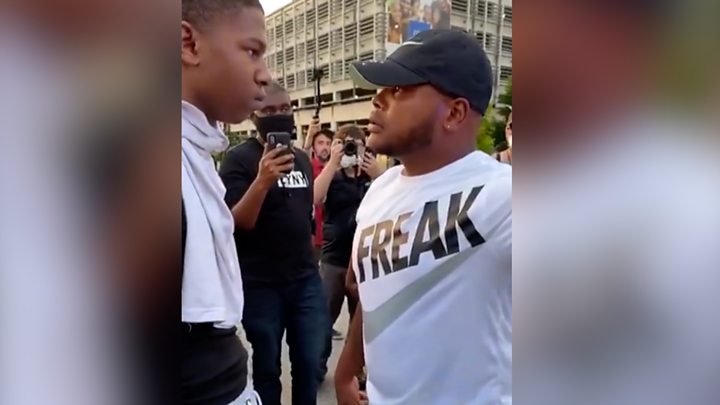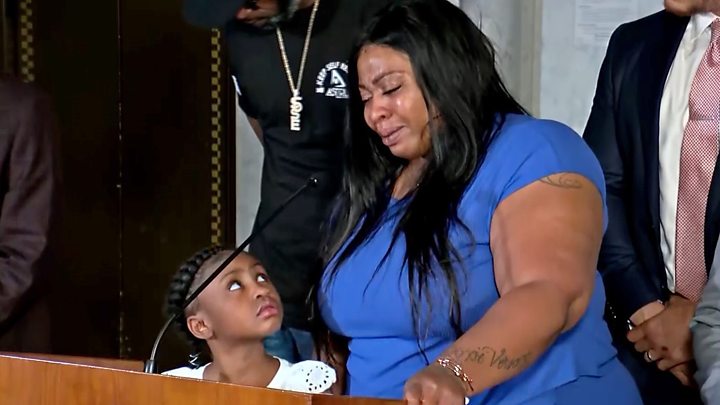New charges have been announced against all of the sacked police officers present at the death of African American George Floyd in Minneapolis.
The charge against Derek Chauvin has been elevated to second-degree murder, court documents show.
The other three officers, previously uncharged, face counts of aiding and abetting murder.
Floyd's death has sparked huge protests across the US against racism and the police killings of black Americans.
The vast majority of demonstrations over the past eight days have been peaceful, but some have turned violent and curfews have been imposed in a number of cities.

Activist explains plea for peaceful protests
Announcing the new charges, Minnesota's Attorney General Keith Ellison said that they were in the interests of justice.
Derek Chauvin had initially faced charges of third-degree murder and second-degree manslaughter. These will stay on his charge sheet.
The other three sacked officers are Thomas Lane, J Alexander Kueng and Tou Thao. They all face charges of aiding and abetting second-degree murder, and aiding and abetting second-degree manslaughter.
Minnesota Senator Amy Klobuchar said on Twitter that the latest charges were "another important step for justice".
Floyd family lawyer Benjamin Crump said in a statement: "This is a significant step forward on the road to justice and we are gratified that this important action was brought before George Floyd's body was laid to rest."
But he later told CNN that the family believed the charge against Derek Chauvin should be first-degree murder and that they had been told that the investigation was ongoing and the charges could change further.
At a press briefing, rights activist Rev Al Sharpton said that the Floyd case must lead to a national federal act.
He said: "If we come out of all this and do not have federal legislation where we can protect citizens from local policing... then all of this is drama to no end. Drama in the street must be geared to fundamental legal change."

George Floyd's ex partner: 'Gianna doesn't have a father'
What did the attorney general say?
Mr Ellison said he was under no illusion that bringing a successful prosecution against the former police officers would be difficult.
"Winning a conviction will be hard. History does show there are clear challenges," he said.
Only one officer in Minnesota has been convicted of killing a civilian while serving in the role.
Mr Ellison said George Floyd was "loved by his family, his life had value" and that "we will seek justice for you and we will find it".
He said bringing justice to society more generally would be slow and difficult work and that Americans did not have to wait for the end of the Floyd case to start that work.
"We need to rewrite the rules for a just society now," he said.
What do the charges mean?
First- and second-degree murder under Minnesota law require proof that the defendant intended to kill. First-degree in most cases requires premeditation, with second-degree more related to crimes of passion.
A third-degree murder conviction would not require proof that the defendant wanted the victim to die, only that their actions were dangerous and were carried out without regard to human life.
A second-degree murder conviction can carry a sentence of up to 40 years, 15 longer than for third-degree.
What's the background?
George Floyd, 46, was stopped by police investigating the purchase of cigarettes with counterfeit money on 25 May in Minneapolis.
A video showed Floyd being arrested and a white police officer continuing to kneel on his neck for several minutes even after he pleaded that he could not breathe.
Protests erupted and have continued since, across many US cities and also internationally, with rallies on Wednesday in Australia, France, the Netherlands and in the UK, where thousands gathered in central London.
The Floyd case follows the high-profile cases of Michael Brown in Ferguson, Missouri; Eric Garner in New York; and others that have driven the Black Lives Matter movement in recent years.
For many, the outrage over Floyd's death also reflects years of frustration over socio-economic inequality and discrimination.
US protests timeline
George Floyd dies during police arrest
George Floyd dies after being arrested by police outside a shop in Minneapolis, Minnesota. Footage shows a white officer, Derek Chauvin, kneeling on Mr Floyd’s neck for several minutes while he is pinned to the floor. Mr Floyd is heard repeatedly saying "I can’t breathe". He is pronounced dead later in hospital.
Protests begin
Four officers involved in the arrest of George Floyd are fired. Protests begin as the video of the arrest is shared widely on social media. Hundreds of demonstrators take to the streets of Minneapolis and vandalise police cars and the police station with graffiti.
Protests spread
Protests spread to other cities including Memphis and Los Angeles. In some places, like Portland, Oregon, protesters lie in the road, chanting "I can’t breathe". Demonstrators again gather around the police station in Minneapolis where the officers involved in George Floyd’s arrest were based and set fire to it. The building is evacuated and police retreat.
Trump tweets
President Trump blames the violence on a lack of leadership in Minneapolis and threatens to send in the National Guard in a tweet. He follows it up in a second tweet with a warning "when the looting starts, the shooting starts". The second tweet is hidden by Twitter for "glorifying violence".
CNN reporter arrested
A CNN reporter, Omar Jimenez, is arrested while covering the Minneapolis protest. Mr Jimenez was reporting live when police officers handcuffed him. A few minutes later several of his colleagues are also arrested. They are all later released once they are confirmed to be members of the media.
Derek Chauvin charged with murder
Former Minneapolis police officer Derek Chauvin, 44, is charged with murder and manslaughter. The charges carry a combined maximum 35-year sentence.
Sixth night of protests
Violence spreads across the US on the sixth night of protests. A total of at least five people are reported killed in protests from Indianapolis to Chicago. More than 75 cities have seen protests. At least 4,400 people have been arrested. Curfews are imposed across the US to try to stem the unrest.
Trump threatens military response
President Trump threatens to send in the military to quell growing civil unrest. He says if cities and states fail to control the protests and "defend their residents" he will deploy the army and "quickly solve the problem for them". Mr Trump poses in front of a damaged church shortly after police used tear gas to disperse peaceful protesters nearby.
Eighth night of protests
Tens of thousands of protesters again take to the streets. One of the biggest protests is in George Floyd’s hometown of Houston, Texas. Many defy curfews in several cities, but the demonstrations are largely peaceful. BBC